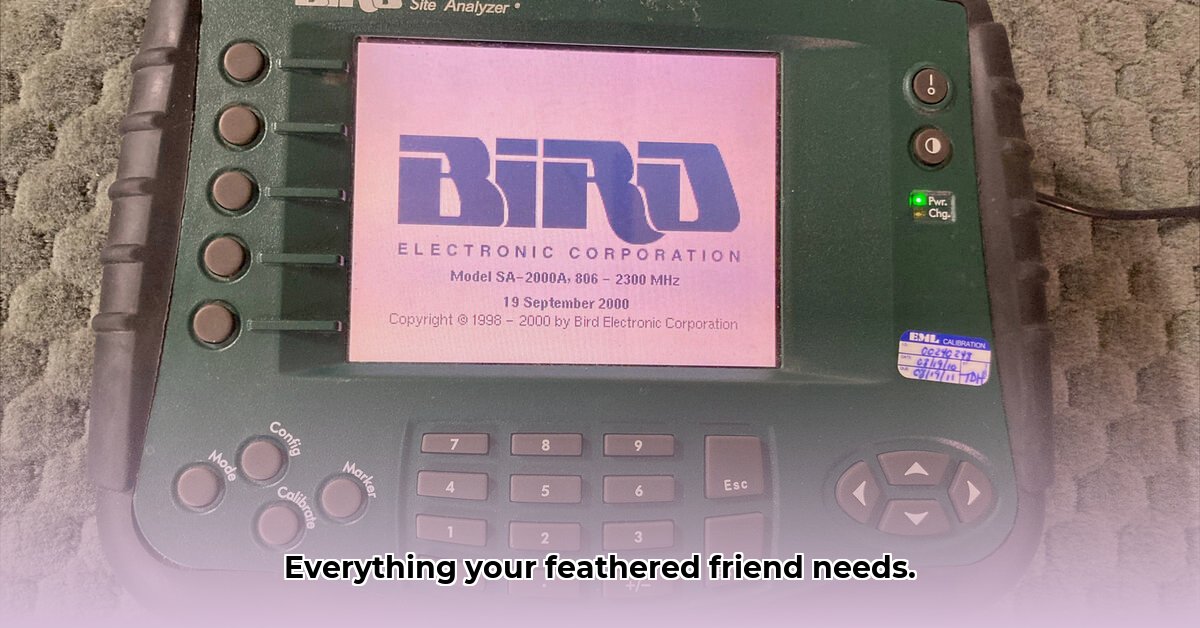
Bringing a new feathered friend home is exciting! But ensuring their health and happiness requires careful planning. This guide helps you navigate the world of bird supplies, focusing on choosing the right food, toys, and cage accessories to create a thriving environment for your avian companion.
Understanding Your Bird's Unique Needs
Before purchasing any supplies, consider your bird's specific needs. These vary greatly depending on several key factors:
- Species: A small finch has different needs than a large parrot. Research your bird's species to understand its specific dietary and environmental requirements. Some breeds require specialized food or toys.
- Age: Baby birds (fledglings) need different food and habitats than adults. A fledgling needs a carefully balanced diet for growth, while an adult's needs focus on maintaining health.
- Health: If your bird has health issues, consult your avian veterinarian for guidance on specific dietary or environmental needs. They may recommend specialized food or toys.
Ask yourself these questions: What species is my bird? How old is it? Is it healthy? Consulting an avian vet or experienced bird owner is always a good idea.
Finding Reputable Suppliers
Choosing the right supplier is crucial. Direct-to-consumer retailers (like Birdsafe Store) sell their own products. Directories (like BirdSites.net) connect you with multiple sellers. Both have advantages, but careful consideration is needed.
When selecting a supplier, consider:
- Customer Reviews: Positive reviews indicate a reputable seller with high-quality products and good customer service. Websites with many negative reviews should be avoided to prevent issues.
- Return Policy: A fair return policy protects you if a product is faulty or unsatisfactory. Always check the return policy before purchasing.
- Shipping Practices: Reliable shipping is essential for the safe arrival of your bird's supplies. Look for sellers with good track records of safe and timely delivery.
Whether shopping online or locally, compare prices and don't hesitate to ask questions. A thorough approach ensures your bird receives the best possible care.
Choosing the Right Food: Fueling a Happy Bird
Nutrition is paramount! Poor nutrition can lead to illness and shorten your bird's lifespan. Two main types of bird food exist:
| Food Type | Advantages | Disadvantages |
|---|---|---|
| Pellet-Based | Balanced nutrition, less mess, easier storage | Can be less appealing to some birds |
| Seed-Based | More variety, preferred texture by some birds | Can be nutritionally unbalanced, more waste |
High-quality brands (Harrisons, Goldenfeast, ZuPreem) offer balanced blends. While seed mixes offer variety, pellet-based diets usually provide more complete nutrition. Consult your avian veterinarian to determine the best food for your bird's specific needs and age. Isn't it important to give our feathered friends the best possible start in life?
Selecting Safe and Engaging Toys: Mental and Physical Stimulation
Toys are essential for preventing boredom and providing mental and physical stimulation. Safety, however, is a top priority.
- Avoid small items: Prevent choking hazards by avoiding anything small enough to be swallowed.
- Use non-toxic materials: Ensure all materials are safe for your bird.
- Choose sturdy toys: Select toys that can withstand vigorous chewing.
Consider these toy types:
- Foraging Toys: Encourage natural foraging behaviors.
- Chew Toys: Essential for beak maintenance.
- Swing Toys: Provide exercise and a fun perch.
Remember to rotate toys regularly to maintain interest and always supervise playtime. Maintaining a stimulating environment is key to a happy bird. Don't you want your bird to have a fulfilling life?
Essential Cage Accessories: Creating a Comfortable Home
The cage is your bird's home, so it must be safe and comfortable. Essential accessories include:
- Perches: Offer various sizes and materials to prevent foot problems.
- Food and Water Dishes: Choose durable, easy-to-clean options.
- Cleaning Supplies: Use bird-safe cleaning products to maintain hygiene.
Choose an appropriately sized cage to avoid overcrowding, which can cause stress. Ensure adequate ventilation and a secure latch. Providing a safe and comfortable environment is fundamental to your bird's well-being.
Beyond the Basics: Enhancing Your Bird's Life
Responsible bird ownership extends beyond the basics.
- Veterinary Care: Regular checkups are crucial for preventative care.
- Training and Enrichment: Positive reinforcement training strengthens the bond and provides enrichment.
- Community Resources: Connect with other bird owners for support and learning.
Remember, responsible bird ownership is an ongoing journey. By providing high-quality supplies and a stimulating environment, you ensure your feathered friend lives a long, healthy, and happy life. Providing a rich and stimulating environment for your bird is not just a good thing to do; it’s essential for its well-being.